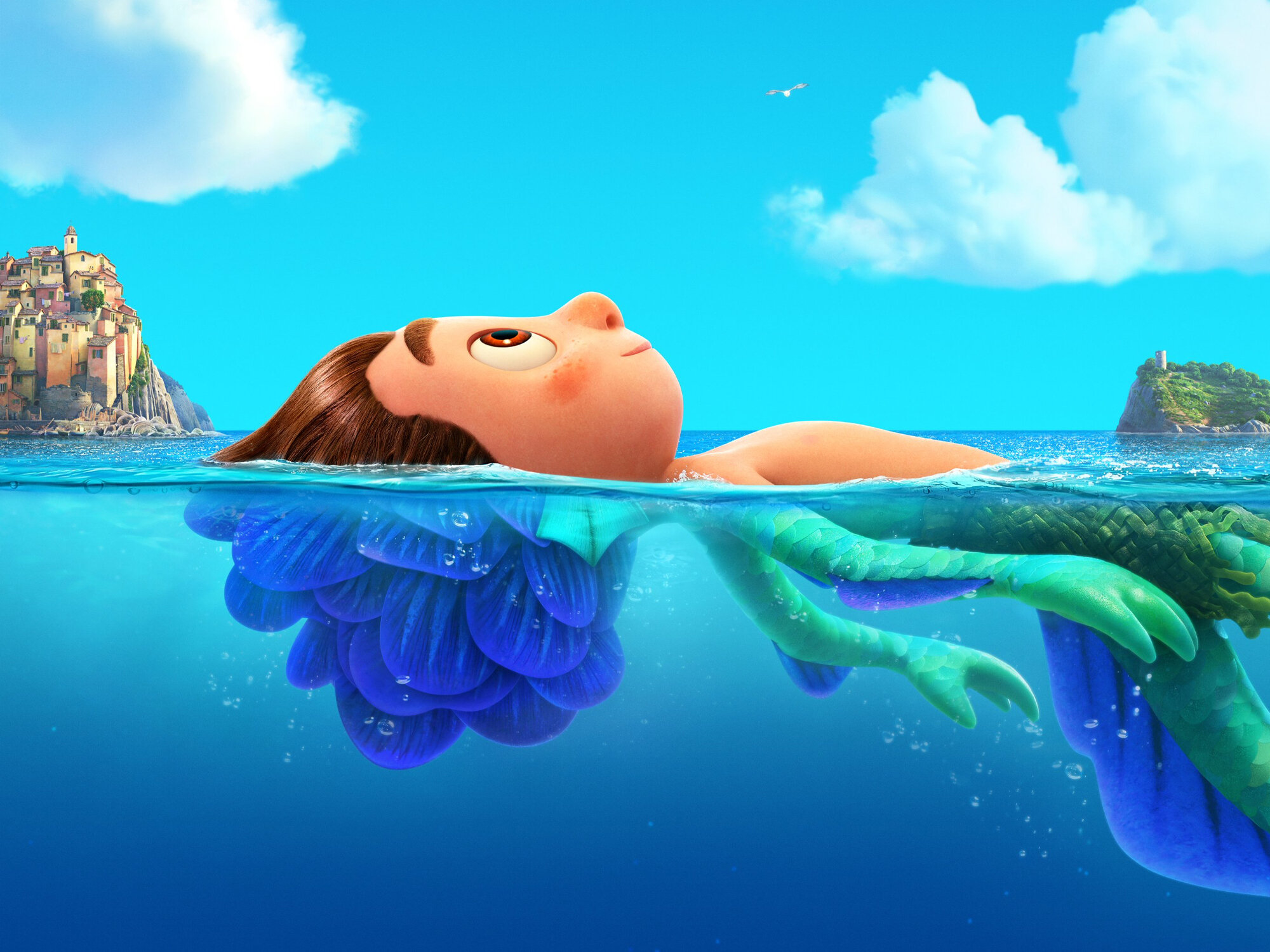Film Review: Luca
“Silenzio, Bruno!” Pixar lightens the load with the charming, vividly exuberant Luca
Taking a step back from swing-for-the-fences epics, Pixar’s Luca tells a tale about courage, acceptance, and friendship through a pasta-chomping triathlon. The Italian Riviera comes to rousing life in Disney’s newest animated adventure, celebrating the underdog with joyful performances and playful animation. Where Onward and Soul perhaps bit off a little more than they could chew, Luca lives comfortably in its charming, small-scale journey. Minor spoilers ahead…
Ingenious concepts. Epic adventure. Big emotions. These are the core tenets of Pixar’s animation empire. Over the last few years, Disney’s premier hitmaker studio has held steadfast in its recipe, even if its resumé isn’t as unimpeachable as it used to be. The discourse has brought up the “Pixar slump” time and time again, especially recently; its banner 2020 releases of Onward and Soul were well-received and deservedly praised for their emotional heft, but many pointed out - correctly or incorrectly, it’s up to debate - that Pixar’s newer, lofty concepts were getting a little too unwieldy for their narrative britches. And those accustomed to the studio’s swing-for-the-fences ideas will likely continue the “slump” narrative for its latest film, Luca, albeit for different reasons. Naysayers will call the film “mid,” or “slight,” or “inconsequential,” but that’s also where they would be misguided. You see, Luca, perhaps more than any other Pixar film in recent memory, is a vibe - a tender, playful bop that revels in the small stuff while still delivering the emotional resonance that’s become its studio’s signature. Luca - without a doubt - is top-tier Pixar.
Last year, Onward told the story of two elf brothers vying to resurrect their dead father for one more day through a swords-and-sorcery fantasy epic. Soul gave us the journey of a high school band teacher in the afterlife as he attempts to decipher the meaning and purpose of his existence. And Luca? Well, Luca is just about two best friends who enter a pasta-eating, bike-riding triathlon in the Italian Riviera to win a Vespa. And they just happen to be sea monsters. In a break from Pixar tradition, Luca leaves behind existential ponderings for an intimate story about underdogs, friendship, and acceptance - and its lower stakes only bolster its characters and emotional weight.
“In a break from Pixar tradition, Luca leaves behind existential ponderings for an intimate story about underdogs, friendship, and acceptance…”
Luca (Jacob Tremblay) is a curious sea monster who would love nothing more than to explore the surface world, but his well-meaning but overprotective parents (Maya Rudolph and Jim Gaffigan) do everything they can to put a kibosh on his burgeoning interest in land-dwelling. He quickly becomes fast friends with another of his kind - the freewheeling Alberto (Jack Dylan Grazer) - who encourages him to run away to a human town where they can save up enough money to buy a Vespa and travel the world. When the chance to win the cash comes in the form of the Portorosso Cup, a triathlon that includes a leg of pasta-eating, the two team up with Giulia (Emma Berman), the local fisherman’s daughter, to win the trophy and their moped.
It’s a pared-down and familiar narrative, for sure: There are trope-y monster-fearing townsfolk, a petulant local bully (Saverio Raimondo), and plenty of antics when it comes to the boys keeping up their human guises, but Luca’s Pixar magic doesn’t lie in big ideas or mind-bending concepts. Luca’s charm is pulled straight from director Enrico Casarosa childhood; the filmmaker wanted to tell a story based upon his experiences growing up in Genoa, Italy, and every pixel of the movie comes across as a labor of love. The narrative’s simplicity lets all of its characters breathe in their exaggerated, Gumby-esque magnetism, and the rustic Italy comes to life with one of the studio’s lushest brushes in years - and coming from the studio that’s brought us Finding Nemo, WALL-E, and Coco, that’s saying something. From the pastels of the Riviera abodes to the cobblestones of the Genoa streets, Luca hums with the haze of a wistful memory.
Set aside the fact that Luca doesn’t have anthropomorphized emotions or journeys that transcend the boundaries of life and death, and you’ll find an intimate little tale about magical summers and new friendships, anchored not by grandiose “eureka” moments of catharsis, but by everything in between: Luca and Alberto trying gelato for the first time, Giulia’s competitive spirit and passion for the Portorosso Cup, and Alberto’s “Silenzio, Bruno” method of mustering courage, these are all stitches of a colorful tapestry small in nature, but rich in substance. You can call Luca “shallow” or “unambitious,” but the film is fearless in resisting the signposts that say “go big or go home,” and instead revels in its intricacies and characters to tell an emotional coming-of-age story.












